#french imperialism
Explore tagged Tumblr posts
Text
The franc CFA (originally denoting Colonies françaises d’Afrique) is the official currency of Senegal and most other former French colonies in Africa, from before national independence through the present-day. This monetary system and its history are the subjects of a new book by Fanny Pigeaud and Ndongo Samba Sylla, Africa’s Last Colonial Currency (2021), translated by Thomas Fazi from a 2018 French edition. The book brings to the attention of Anglophone readers the peculiar institutions through which the French Republic continues to exercise colonial rule over nominally independent African states. France’s recent “counterterrorism” operations across the Sahel region (supported and rivaled in scope by the United States’ Africa Command, AFRICOM) represent only one phase in what the Black Alliance for Peace (2020) has called France’s “active and aggressive military presence in Africa for years.” [...] One of Pigeaud and Sylla’s commitments and achievements is to show how “French ‘soft’ monetary power is inseparable from its ‘hard’ military power” (2021: 99). In their telling, the CFA franc has for decades been France’s secret weapon in “Françafrique,” the zone in Africa where France, its representatives, and its monetary system have never really left. [...]
---
The franc CFA was born in Paris on the 25th of December, 1945 [...]. The embattled empire was compelled to “loosen its grip” in Africa [in the midst of anticolonial fervor outside of Europe, and with rise of “decolonization” in metropolitan/European public discourses] [...]. Consequently, argue Pigeaud and Sylla, the creation of the CFA franc was “actually designed to allow France to regain control of its colonies” (13). What Minister Pleven called generosity might better be called a swindle. [...] French goods-for-export, now priced in a devalued currency (made cheaper), would find easy markets in the colonies [...]. African goods - especially important raw materials, from uranium to cocoa, priced too expensively for domestic consumption [...] -- would find buyers more exclusively in France [...]. In effect, the new CFA monetary policies re-consolidated France’s imperial economy even as the monopoly regime of the colonial pact could be formally retired in recognition of demands for change from colonial subjects. [...] [T]he egalitarian parlance of community and cooperation modernized French colonial authority, making it more invisible rather than marking its end. [...]
---
Most importantly, France has held up a guarantee of unlimited convertibility between CFA francs and French currency [as its so-called most benevolent feature] [...]. [But] CFA francs can only ever be converted into France’s currency [...] before being exchanged for other currencies [...]. In 1994, in conjunction with the International Monetary Fund and against the wishes of most African leaders, French authorities adjusted the franc zone exchange rate for the first time, devaluing the CFA franc by half. This blanket devaluation was the shock through which structural adjustment was forced upon Françafrique [...].
And the devaluation proved, to Pigeaud and Sylla, that France’s “‘guarantee of unlimited convertibility’ was an intellectual and political fraud” (74). Nevertheless, French authorities have continually held up - that is, brandished and exploited - this guarantee, without honoring it. [...] Pigeaud and Sylla do not mince words: “France uses its presumed role of ‘guarantor’ as a pretext and as a tool to blackmail its former colonies in order to keep them in its orbit, both economically and politically” (38). [...] In that respect, the CFA franc system has ensured [...] the stabilization of raw material exportation and goods importation, hierarchy and indirect rule, [...] accumulation and mass impoverishment, in short, the colonial order.
---
And all along, France has found - or compelled, coerced, and more-or-less directly put in place - useful political partners in Françafrique. [...]
The CFA franc has been central to the French strategy of decolonization-in-name-only. [...]
When and where demands for self-determination and changes to the monetary system (usually more minor than exit or abolition) have been strongest, from charismatic leaders or from below, they have been met with a retaliatory response from France and its African partners, frequently going so far as “destabilisation campaigns and even assassinations and coups d’état” (40). [...]
The first case is exemplary. In 1958, Ahmed Sékou Touré helped lead Guinea to independence [...]. Guinea was alone in voting down De Gaulle’s “Community” proposal [...], and [...] the new state established its own national currency and central bank by 1960. [...] [T]he decision was ultimately made to make Guinea a cautionary tale for the rest of Françafrique. French counter-intelligence officials plotted and hired out a series of mercenary attacks (“with the aim of creating a climate of insecurity and, if possible, overthrowing Sékou Touré,” recalled one such operative), in conjunction with “Operation Persil,” a scheme to flood the Guinean economy with false Guinean bills, successfully bringing about a devastating crash (43). [...] Yet, Sékou Touré was never removed, only ostracized - unlike Sylvanus Olympio in Togo or Modiba Keita in Mali, others whose (initially minor) desired changes to the CFA status quo were refused and rebuffed and who were then deposed in French-linked coups. [...]
So too the Cameroonian economist Joseph Tchundjang Pouemi, an even more overlooked figure since his death at the age of 47 in 1984. Pouemi’s experience working at the IMF [International Monetary Fund] in the 1970s led him to recognize that the leaders of the international monetary system would “repress any government that tries to offer their country a minimum of wellbeing” (60) and could do so especially easily in Françafrique because of the CFA franc.
---
All text above by: Matt Schneider. “Africa’s Last Colonial Currency Review.” Society and Space [Book Reviews section of the online Magazine format]. 29 November 2021. [Bold emphasis and some paragraph breaks/contractions added by me. Presented here for commentary, teaching, criticism purposes.]
#colonial#imperial#abolition#french algeria#carceral#debt and debt colonies#tidalectics#black methodologies#indigenous#kathryn yusoff#katherine mckittrick#french imperialism
74 notes
·
View notes
Text
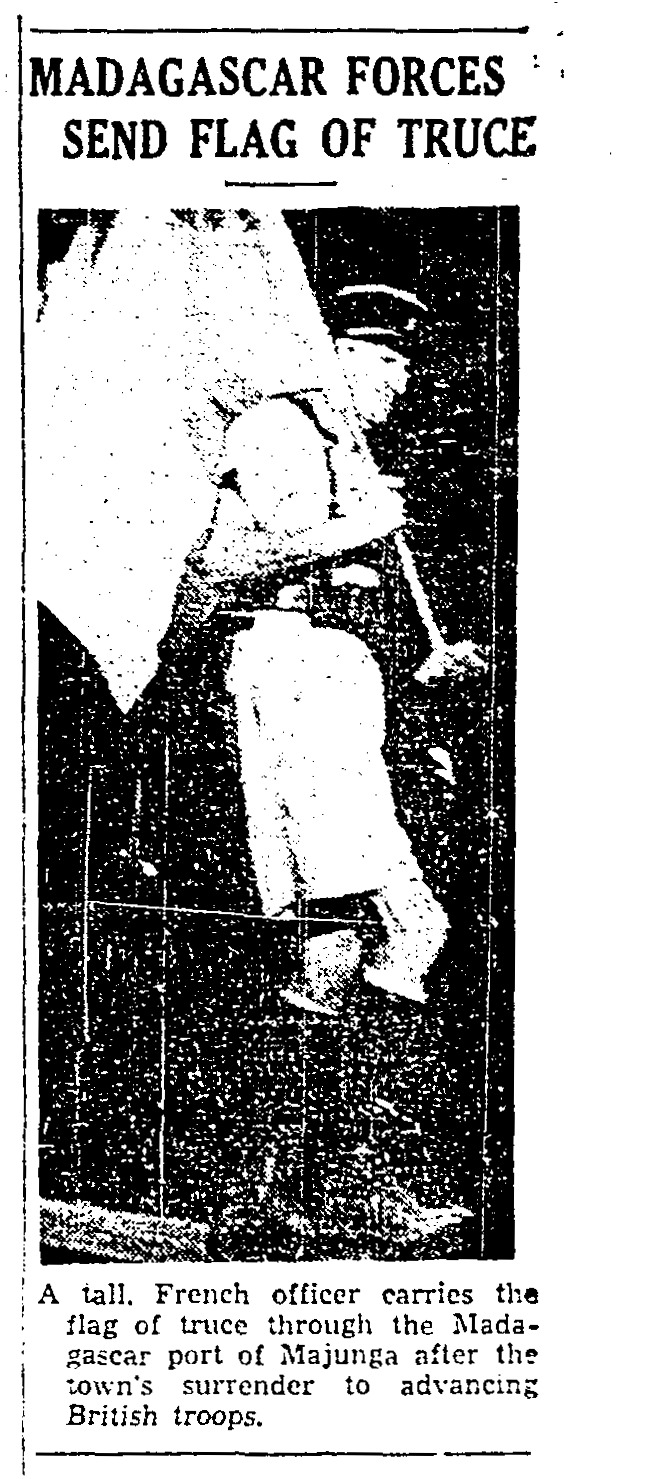
"MADAGASCAR FORCES SEND FLAG OF TRUCE," Toronto Star. October 14, 1942. Page 3. --- A tall. French officer carries the flag of truce through the Madagascar port of Majunga after the town's surrender to advancing British troops.
#battle of madagascar#operation ironclad#vichy france#french colonial empire#mahajanga#majunga#french imperialism#vichy in the tropics#armée française#bataille de madagascar#régime de vichy#white flag
3 notes
·
View notes
Text
Meanwhile in Canada

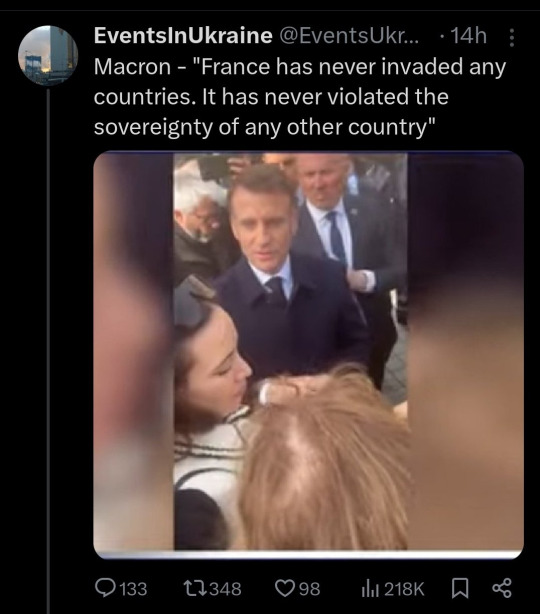
I'm sorry what the fuck did you just say ??? This has to be fake.
54K notes
·
View notes
Text
Ok so the translation on how france used dialectics, debates, and psychosocial intervention as a mean of brainwashing young Algerian students is actually ok so here it is.


#fanon#ibrahim omar fanon#frantz fanon#the wretched of the earth#brainwashing#colonialism#french imperialism#one thing is that the frencj doesnt say psychologists and therapists it says more psychologists and 'social life psychologists'#which likely refers to contemporary social workers
1 note
·
View note
Text
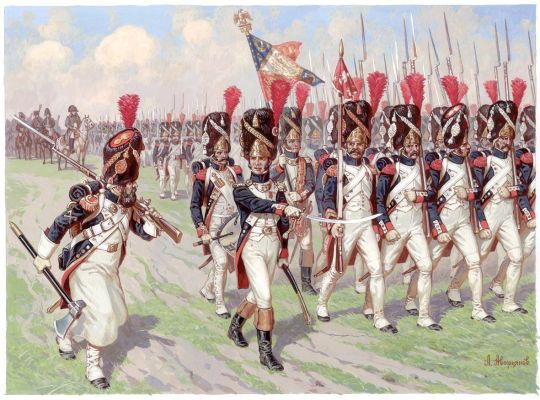
#napoleonic wars#grenadiers#old guard#grenadiers à pied#imperial guard#the immortals#grande armée#french empire#france#french#first french empire#history#napoleon bonaparte#napoléon bonaparte#grenadier#art#europe#european#soldiers#napoleonic#emperor#napoleon#napoléon#empire#bonaparte#axe#sapper#flag#banner#eagle
237 notes
·
View notes
Text
i finished rereading the first four vorkosigan books (+ "the flowers of vashnoi" because ekaterin!!!), and you really have to feel for piotr vorkosigan because what a nightmare life, truly.
imagine you are born just in time for your world to be unified by dorca vorbarra and rediscovered by people from wider galaxy. things are finally looking good, for the first time in 600 years of isolation there is no more feudal infighting, and the promise of galactic medicine and technologies being available lightens everyone's perspectives. sure, your grandpa is called count pierre "le sanguinaire", but who doesn't have terrible relatives?
then you are 15, and suddenly your planet is attacked by the aggressive eugenecist space empire hell-bent on subjugating your people and turning them into disposable material for unethical genetic experiments. you flee into the mountains, away from your family, and create guerrilla forces from locals sworn to your dad, and it's really terrible for a very long time. you have no high-tech weapons and no food, you sleep in a cave in the dead of winter, and the cetagandans try everything (from carpet bombing to chemical weapons) to murder you.
but hey, at least you now have your bff ezar vorbarra, and (from the bff's words on his deathbed) it sounds like you two had so much fun between unimaginable horrors and despair, and it's not surprising, since no one really believes in death after life at 20. then the emperor makes you a general at the tender age of 22. fortunately for him, you & bff make a frighteningly competent dream-team, and the joke's on cetagandans.
then, several years later, you ask the emperor for weapons, because you still sleep on the bare cave floor, there are little resources, and every ghem on the planet is trying to murder you. he offers you the hand of his granddaughter instead, like it's some sort of twisted fairytale, but you grow to love your olivia more than anything, and the tide of war is finally turning, and you allow yourself to entertain the idea of peaceful life, and then...
the space eugenecist empire nukes your hometown, killing your mom, dad, surviving brothers, and two hundred thousand of your people. plus your bff (ezar) gets a radiation doze large enough for it to cause severe cancer thirty years later. great.
but you win! your district is in shambles, your capital is an irradiated crater, your castle is in ruins, but you win! the old dorca dies, and yuri ascends the throne, but politicking is secondary to the fact that you are alive.
yes, you are probably not entirely sane, and you've long forgotten what the peaceful times look like, but you are alive, just under 35, and your entire life is ahead of you. olivia is alive too, and ezar, and you now have three wonderful children, and the extended vorpatril-vorbarra family that hosts regular get-togethers. sure, your mom-in-law is a betan with all sorts of crazy ideas in her head, but she is not pierre vorrutyer. small mercies.
but then the new emperor goes mad, and decides to murder your entire family overnight. your brothers-in-law are gone, one of your sisters-in-law too, and all your nephews and nieces except little padma. but all of this pales in comparison to the facts that olivia is murdered, and that your heir and daughter lay dead beside her.
all you have left of her, of your house, of the family you've lost in vashnoi not a ten years ago, is aral, whom you keep by your side throughout the bloody civil war to put your bff on the throne.
but you win again. you are 43, and ezar vorbarra is now the emperor. you are responsible for the imperium's entire ground forces. you are also responsible for a severely traumatized boy of 13, and the only children you've interacted with without olivia's genle guidance were little messengers of guerilla companies.
what a mess.
#vorkosigan saga#lois mcmaster bujold#piotr vorkosigan#i was also reading /the lives of wonderful people/ books about mikhail vorontsov and alexander benkendorf last month and these two in#their younger years have the exact vibes of piotr and ezar during the first cetagandan war#chase after some poor cossacks on mail duty because you have mistaken them for enimies & you're twenty and long for military glory? yes#fearlessly hang about very dangerous mountains despite the threat of ambush? check#ask your boss to let you travel to YAKUTSK of all places because his inspection of southern siberia is boring and you#want to prove to yourself how cool you are? yes#agree to be someone's second on the duel and then inventively sell it to the emperor? also yes#volunteer for the dangerous expedition to the aegean sea? conquer the unconquerable ottoman fortress? yes and yes#and like..... despite it all they were also competent!#benkendorf ended french occupation of the netherlands in 10 days#and vorontsov was a commander at one of the most dangerous positions during the battle of borodino#during the battle of craonne vorontsov led the infantry and benkendorf the cavalry and together they held their own against napoleon!#but yes general-fieldmarchal count vorontsov the imperial governor of everything between modern moldova and the caspian sea#and cavalry general benkendorf who was the feared head of the gendarmes and before that aide-de-camp of emperor alexander#were also once crazy (and crazely talented) twenty year olds#which is basically what guerilla piotr and ezar are
188 notes
·
View notes
Text

I honestly think this map is a bit fucked up no les parece
oh nothing it's just the US military casually (not so casually) admitting "we aren't a force to defend our country, we are a force to enforce our empire, and that empire is the entire planet"
#hey US why does your country has an entire military command for our continent#why does your country has an entire military command for FUCKING SPACE#cosas mias#imperialism#I don't think even the British or the French laid claim to the whole of Earth like the US does#for the US military they own the world in practice and other countries are just pesky rebel provinces or vassals
2K notes
·
View notes
Text
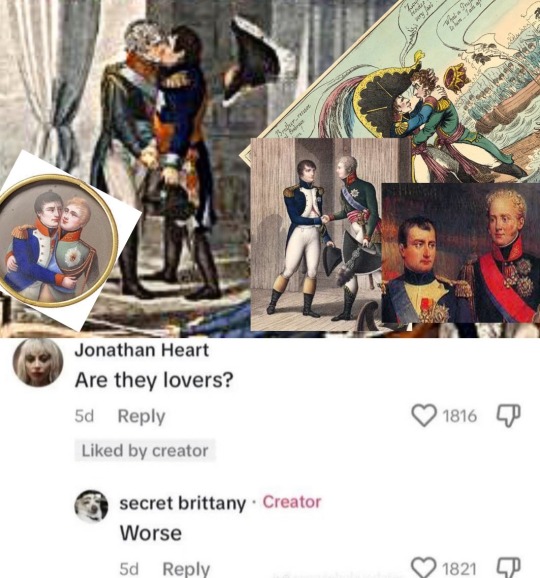
#Napoleon and tsar Alexander#Napoleon#tsar Alexander I#napoleonic era#history memes#russian history#french history#napoleonic#napoleon bonaparte#first french empire#19th century#history#imperial Russia#Russia#France#tsars
457 notes
·
View notes
Note
Hi! Do you have any recommendations for people who are trying to get into Roman history? (Specifically the Roman Republic)
I’ve started with Rubicon by Tom Holland, but I’m curious if you have any other book recommendations or books you love about this time period?
tbh I care more about the creative-social history/legacy/reception involving the Roman Republic than the actual study of Roman history as a whole, so when I think of entry ways for getting into the Late Republic, it's more like: Shakespeare's Julius Caesar or HBO Rome (AND OFC, MY BELOVED STARZ SPARTACUS) followed by Manfredi Piccolomini's The Brutus Revival or M.L. Clarke's The Noblest Roman (getting interested in Spartacus will take you everywhere you need to go with the Republic also)
alternatively, picking a roman politician and getting really weird about them will also take you all over the place, since roman politicians don't die normally.
otherwise, what I usually recommend when people ask me about learning more about the Republic is The Last Generation of the Roman Republic-- wicked title, good read, solid book.
#tom holland's rubicon is a pretty fun read tho i'd stick with it if you're enjoying it#honestly the french cleopatra musical did more for sparking an interest in early imperial roman research than any particular#book on the subject. i read biographies on mark antony to better formulate thoughts on the antony-octavian dynamic at play#in that musical and i do not. as a general rule. care enough about mark antony to fully read one of his biographies#altho that's also because no one who writes about him really has anything new to say? it's not as interesting. BUT. for that musical#i was like. oh ho. my curiosity. consider it piqued. obviously the only thing to do is compare all antony-octavian-octavia dynamics#in every media that portrays them and see what thoughts shake loose
37 notes
·
View notes
Text
There was a line in the sand - a border, or rather the idea of one. This idea described a frontier, delineated a boundary. In 1852 transgression of this idea and the sovereignty it represented angered Bey Ahmad of Tunis. [...] [T]he government of [French] Algeria accelerated plans to undertake a tour of the frontier [...], to define the spatial limits of French power. [...] [T]he bey wrote a letter to the French consul [...]. The two powers had to work together, each having representatives present [...]. The response came from Paris. The prince-president (Napoleon III), the minister of foreign affairs, and the minister of war all agreed with the bey [...]. The barrier was real, the border inviolable, the idea held. So the bey and the president understood each other. [...] [But] [a]n internal letter [among French officials] explained the thinking behind the military's territorial violation: [...] it was necessary to "display clearly [the French military's] position on the frontier and to act to take possession of the country that we have claimed." This was important even if the act itself exposed the border's unreality. [...]
In such a way, belief in the border exposes a kind of irrationality at the heart of modern state power: the very basis of modern sovereign claims - territoriality - was an abstraction that only distance from the influence of local events could make appear real. The idea of the frontier that the French president and the Tunisian bey shared was the modern belief in the reality of borders, of their existence as barriers. That these two shared this idea tells us something about the appearance of modernity in the Maghrib in the late nineteenth century. [...]
---
Anxiety about the situation along the frontier was manifested not only in French military sorties and "inspection tours": we can also see it in the positioning in the colonial imaginary of migratory and transhumant populations as anti-modern. Seemingly unconcerned with national boundaries [...], these populations were cast as mere violent holdovers of the "traditional" practices of the Maghrib, soon to disappear before the progress of modern social organization and governmentality. [...] The [French] minister of war held that the government of Algeria should secure the border because unrest was "hampering the industrial development of the La Calle region and slowing the normalization of our authority among the tribes [...]." His reasoning did not necessarily reflect that of the cultivators who were accustomed to moving to lands on either side of the line drawn by Randon or moving their flocks within a generally elastic space. The dictates of imperial economics (i.e., mineral exploitation) were here locked into a territorially-bound sense [...].
The government of Algeria - which was at that point, legally in any case, the French government - [...] based claims to sovereignty on the ability to control violence [...]. This [French military] officer led soldiers across the northern Algerian-Tunisian border, stopping to talk with all the groups [...]. The minister of war wrote that, while this action was indeed problematic on the diplomatic scale, it was necessary and right on the local scale. "Our administrative interests cannot be left outstanding - our dignity itself is at stake in giving to the tribes evidence of our [power] [...]" and "this operation is necessary to tranquilize our tribes and organize the means of repression." [...] In effect, the local scale necessitated a processional display of state power [and literal physical violence] to ensure its claims, while the international scale necessitated the abstraction of fixed and territorialized power. [...]
---
[I]n the winter of 1876 [...], [t]he territorialized nation-state was finally achieved. This rosy picture did not last. Even after the French occupation of Tunis [...] in 1881, belief in the border failed to spread to the scale of local life and governance. [...] Certainly the border, even a border that had largely been agreed upon and understood at the level of high politics for nearly three centuries, was a problematic and vexed ides. Only those removed from its immediate reality seemed to believe in it.
Despite the continued efforts of those apostles of modernity on the Algerian side of the border, the border was never as fixed as they thought it should be. Concerned reports about it continued [...] to fill the saddlebags of imperial postmen well after the establishment of the protectorate in Tunisia. The “realness” of the border was a matter of both material reality and socio-juridical imagination. The border between the Regency’s tribes and those of the dey in Constantine, for instance, had existed (more or less) since the 1500s. But these were obviously different conceptions of what made the border. [...] The border would be “real” for these French officials when groups on either side stopped transgressing the imaginary barrier the Regency and France had erected. Vexing to the French imperial imagination was the apparent breakdown of the concept of state power based on maintaining the monopoly of violence in a certain region: “We reserve to ourselves the right to penetrate into the territory of neighboring tribes that breach the interests of our tribes or territory and to punish them emphatically.” [...] Beyond informing people of their legibility to the state vis-à-vis taxes, the point of the multiple tours, meetings, raids, and trades [...] was thus to show off the power of the French war-making apparatus in order to claim for it sole legitimacy. [...] [T]he land claimed by the French becomes practical, modern territory only when the people living there accept the claims to sovereign authority of the French - not before. There is effectively no border until the people believe there is and act on that belief. [...]
That this type of thinking was not the special purview of the “recalcitrant” tribes themselves is reflected in a letter a French advisor to the Tunisian army wrote to the French minister of war in 1862: “Some have wanted to have a frontier delimination between the Regency [of Tunis] and Algeria; it is necessary, as Your Excellency has recognized, that the frontier remain vague. Let us not commit the present, let us reserve for ourselves the future, and let us not raise barriers between the rich valley of the Medjerdah, and the metallurgic deposits and the cork forests of the Tabarka mountains, [and Algeria].” From his vantage point on the ground, this officer saw a different relationship between the border and the territorial position of sovereignty than did the president or bey. The importance of the imperial project was better reflected in not securing a border. But this understanding did not make its way up the chain of command. There a "real" border was necessary.
---
All text above by: Brock Cutler. "Believe in the Border, or, How to Make Modernity in the Nineteenth-Century Maghrib". Journal of the Economic and Social History of the Orient 60. 2017. [Bold emphasis and some paragraph breaks/contractions added by me. Presented here for commentary, teaching, criticism purposes.]
#lol last quote french military advisor who so obsessed with destroying forest for imperial profit that he accidentally became antiborders#like you know what the frontier is an essential sacred concept to our empire BUT if theres more profit beyond the frontier#then we should disregard the same frontier border we are simultaneously claiming to revere#borders are real and sacred until i decide that i want the money on the other side#also the way he is like waxing poetic about the magnificent cork forests and metallurgic deposits#he sees a forest and is like MONEY#your excellency think about the beautiful metallurgic deposits#ecology#abolition#imperial#colonial#indigenous#temporal#pedagogies#ecologies#multispecies#french algeria#french imperialism#black methodologies#idea of the border#tidalectics#archipelagic thinking#geographic imaginaries
17 notes
·
View notes
Text

"Un pacha marocain essaie une mitrailleuse," Le Soleil. May 1, 1943. Page 1. --- Des pachas, des indigènes et des officiers français regardent Son Excellence le pacha ALI D'OUEZZANE, qui est en train de tirer avec une mitrailleuse, son arme favorite. Le pacha Ali, qui est âgé de 75 ans, est le chef de l'une des dernieres tribus a se soumettre à l'occupation du Maroc par les Français, au début du siècle présent.
(International News)
#morocco#french protectorate of morroco#protectorat français au maroc#machine gun#machine gunners#free france#france libre#forces françaises libres#french imperialism#north african campaign#world war ii
1 note
·
View note
Text







Women in History Month (insp) | Week 3: Consorts and concubines
#historyedit#perioddramaedit#women in history#women in history month challenge#my edits#mine#isabella of parma#imperial noble consort dunsu#eleanor of toledo#ines de castro#mme du barry#eugenie of montijo#empress fu shou#austrian history#chinese history#italian history#french history#portugese history#18th century#15th century#3rd century#14th century#19th century
153 notes
·
View notes
Text








The Boxer Rebellion
The year was Nineteen-Hundred 'Tis worth remembering The men who lived through Fifty-five days at Peking
This is a cross-over episode, a unique partnership of a handful of nations that would fight a world war against each other in less than two decades. There is also a really nice Jazz remix of the 55 days at Peking song I really enjoyed.
The pictures somehow removed the descriptions of the soldiers, if any of you want to know the unit just ask and I can look them up in the source.
From "Osprey Men-at-Arms 095 - Boxer Rebellion"
#55 days at Peking#Boxer Rebellion#1900#20th century#British Empire#French History#Imperial Russia#Kingdom of Italy#austria hungary#empire of Japan#Chinese Empire#USA#European History#East asian history#history#military art#military#soldier#cavalry#french uniform#japanese uniform#british uniform#american uniform#austrian uniform#russian uniform#indian uniform#british india
31 notes
·
View notes
Text
If what’s happening in France right now was happening in the Global South there would be talks about sending troops to bring democracy in France.
The leaders and big figures of the opposition who support Palestinians are getting summoned by the police one by one for refusing to call October 7th a terrorist attack (for the record a lot of them say that it was a war crime because it targeted civilians but not a terror attack so they don’t even support what happened).
All while letting Zionist who actually called for mass murder on live TV get away with it.
But you know what? As strange as it sounds it’s actually a good sign. One of the most violent day for Algerians during the war of liberation (17 October 1961) happened less than a year before the independence just a couple months actually (the independence was on July 5th 1962 but it was signed in March 1962). Because that’s how the colonizers behave and think. The crackdown in France, the new German law forbidding the use of Arabic and Hebrew at pro Palestinian protests, the crackdown in US universities… a wounded dying beast always get more violent. They are scared so they try to silence us harder. They know that it’s a matter of time that the fall of colonialism, imperialism and white supremacy will happen in our lifetime so they try to scare us into stopping the fight.
Don’t get me wrong it will be hard and won’t happen overnight but their reactions are convincing me that we will see a Free Palestine a Free Global South a Free world in our lifetimes.
(P.S: tagging the post with Palestine because my previous post being positive about the outcome seemed to help some people who felt hopeless so I hope this one will help too. That being said we don’t have the right to give up the fight and we shouldn’t give up hope either. None of us is free until all of us are.)
393 notes
·
View notes
Text
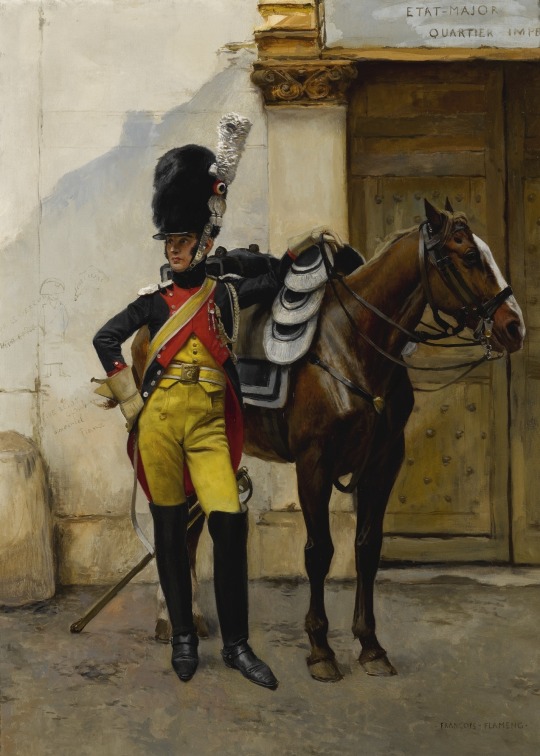
Elite Gendarme of the Imperial Guard by François Flameng
#imperial guard#art#françois flameng#gendarmerie#gendarmes#gendarme#headquarters#emperor#empire#french#france#napoleonic#napoleonic wars#history#europe#european#napoléon#napoleon#bonaparte#horse#napoleon bonaparte#napoléon bonaparte#soldier#soldiers
263 notes
·
View notes
Text

Another painting l did in 2018.
The Nieuport 17 of French WW1 ace Charles Nungesser. He was credited with 43 German aircraft 1916-1918. Despite multiple wounds & injuries, Nungesser survived the war. He vanished in 1927 while attempting the first Trans-Atlantic flight.
@PeteHill854 via X
71 notes
·
View notes